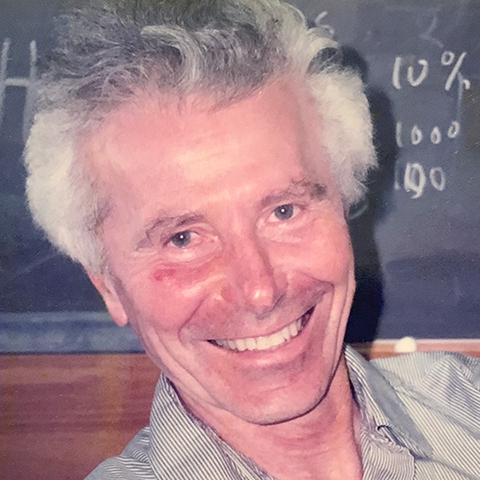In memoriam: Guido Guidotti
Guido Guidotti, a professor of biochemistry at Harvard University who studied the functions of proteins within membranes in transport and signal processing, died April 5 in Newton, Massachusetts. He was 87.

Born Nov. 3, 1933, in Florence, Italy, Guidotti spent most of his early life in Naples. After World War II, he visited Illinois as an American Field Service student. He returned to do premedical studies at Milliken College, then earned an M.D. at the Washington University School of Medicine in St. Louis. He was an intern and resident at Barnes Hospital before earning a Ph.D. in biochemistry from Rockefeller University. He took a position at Harvard in 1963 and remained there until his death.
In his early research, Guidotti used his own blood to determine the sequence and biochemical properties of hemoglobin before moving on to the study of membrane proteins. He identified structures and topologies of numerous proteins and enzymes as well as studying hormone regulation of membrane protein activity. He discovered that the protein CD39, in the cell membrane, hydrolyzes extracellular adenosine triphosphate, ensuring that this extracellular ATP is present at an appropriate concentration.
A member of the American Society for Biochemistry and Molecular Biology since 1968, Guidotti served on the editorial board of the Journal of Biological Chemistry from 1971 to 1976 and published 120 papers in the JBC. He also served on the editorial boards of the Journal of Membrane Biology and Molecular Biology of the Cell.
Nancy Kleckner, Guidotti's wife and a Harvard colleague, wrote in a remembrance, “From the perspective of the outside world, Guido's scientific work was seminally important in many respects … Guido's research was motivated only by his intellectual curiosity, his delight in figuring out how life works, and his joy in enabling the work and lives of the people he trained and with whom he worked. Scientific credit was not a priority.”
Enjoy reading ASBMB Today?
Become a member to receive the print edition four times a year and the digital edition monthly.
Learn moreGet the latest from ASBMB Today
Enter your email address, and we’ll send you a weekly email with recent articles, interviews and more.
Latest in People
People highlights or most popular articles

2026 ASBMB election results
Meet the new Council members and Nominating Committee member.

Simcox wins SACNAS mentorship award
She was recognized for her sustained excellence in mentorship and was honored at SACNAS’ 2025 National Conference.

From humble beginnings to unlocking lysosomal secrets
Monther Abu–Remaileh will receive the ASBMB’s 2026 Walter A. Shaw Young Investigator Award in Lipid Research at the ASBMB Annual Meeting, March 7-10 in Washington, D.C.

Chemistry meets biology to thwart parasites
Margaret Phillips will receive the Alice and C. C. Wang Award in Molecular Parasitology at the ASBMB Annual Meeting, March 7-10 in Washington, D.C.

ASBMB announces 2026 JBC/Tabor awardees
The seven awardees are first authors of outstanding papers published in 2025 in the Journal of Biological Chemistry.

Decoding how bacteria flip host’s molecular switches
Kim Orth will receive the Earl and Thressa Stadtman Distinguished Scientists Award at the ASBMB Annual Meeting, March 7–10, just outside of Washington, D.C.
